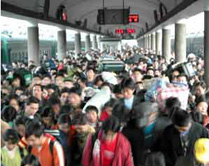 Wang Dahai, a 20-something man from the Inner Mongolia Autonomous Region, stepped out of the exit of the Shanghai Railway Station yesterday in search of a job in the big city.
Wang Dahai, a 20-something man from the Inner Mongolia Autonomous Region, stepped out of the exit of the Shanghai Railway Station yesterday in search of a job in the big city.
After more than 30 hours of travel, he still seemed quite excited.
"I'm coming here for the first time. I hope to find a well-paid job since I've long heard that there are enormous opportunities in Shanghai," said Wang.
He is not alone. Railway stations in big cities around the country are filled these days with migrants from rural areas moving to cities in search of a better life.
"Migrant workers are leaving their hometowns earlier and earlier these years. The total number keeps growing," said Yuan Jiaji, a spokesman for the Shanghai Railway Station.
Fuyang, a city in Anhui Province that is famous for its large number out-bound migrant laborers, saw 134,600 people leave for bigger cities during the three days between February 6 and February 8, an increase of 15 percent from a year earlier.
"Those who have no jobs even came out as early as February 4 or 5 since they're afraid that it's difficult to find jobs after all the factories started operation. I also dare not spend too much time at home because my boss told me that if I'm late, he will fire me," said Liu Jibao, a 40-year-old man from Fuyang who works at a local water-pipe factory.
For farmers like Liu, life is much harder in his hometown.
"A farmer can earn about 200 yuan (US$24.18) from one mu (797.72 square yards) of land every year. My parents grew six mus last year," said Liu.
He, however, is paid 900 yuan (US$108.83) every month at his current job.
"My monthly wage is close to the whole year income if I stayed at home."
Some 70 percent of the total population of his village has moved to coastal cities like Shanghai, Ningbo and Guangzhou, which are among at the forefront of the country's fast-growing economy.
"All the people aged between 18 and 50 have gone, leaving only children who are still studying and old people who plant the fields," said Liu.
While China's big cities have enjoyed impressive economic growth over the last decade, many rural areas have been lagging behind.
"The city's urban construction renders these people great opportunities," said Yang Jianwen, an economist at Shanghai Social Science Institute.
Currently, there are about 3 million migrant workers in Shanghai.
"Since most of the local families only have one child, they'll try best to bring them up to be white-collar workers. The city will need more and more such migrant laborers to work on its labor-intensive jobs in the following 10 to 20 years," said Yang. "It's the same in Guangzhou and Beijing."
(eastday.com February 10, 2003)
|

